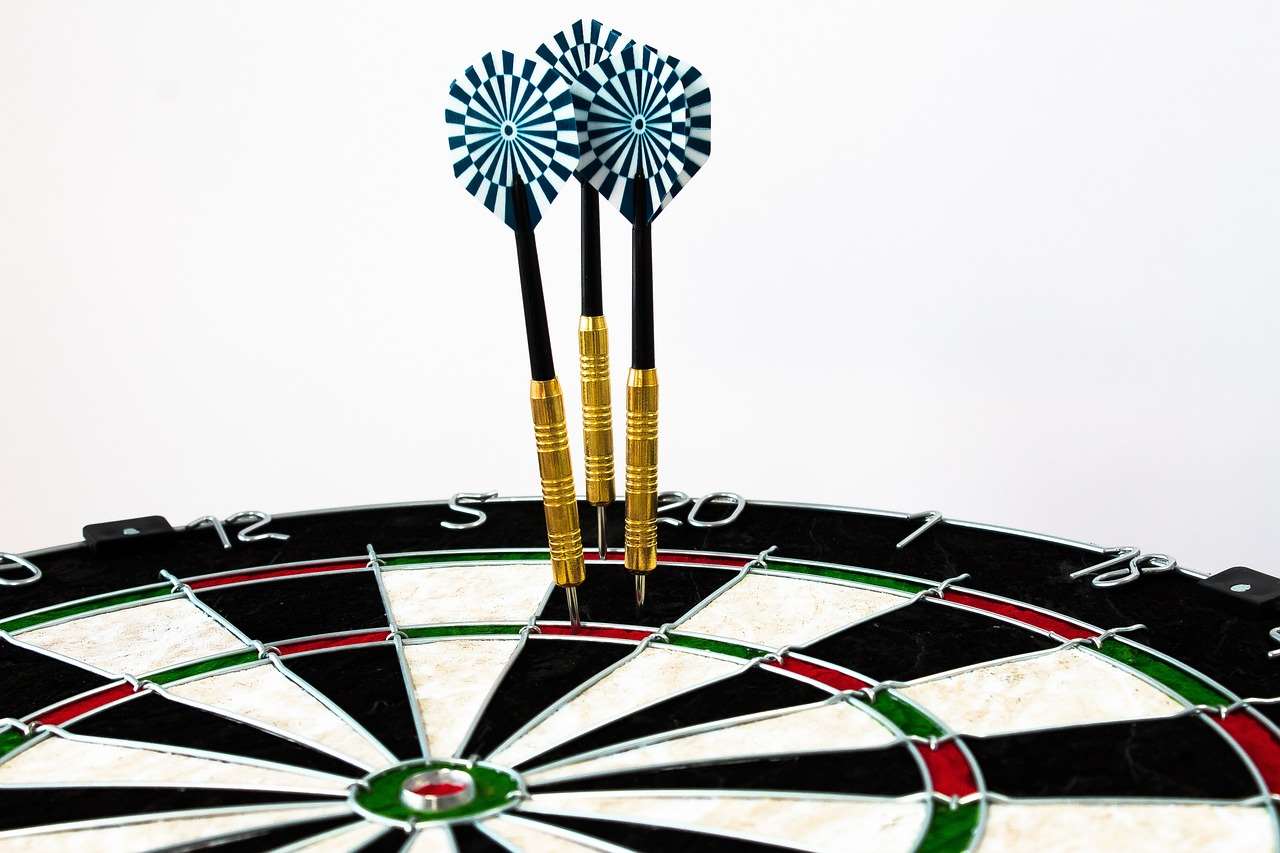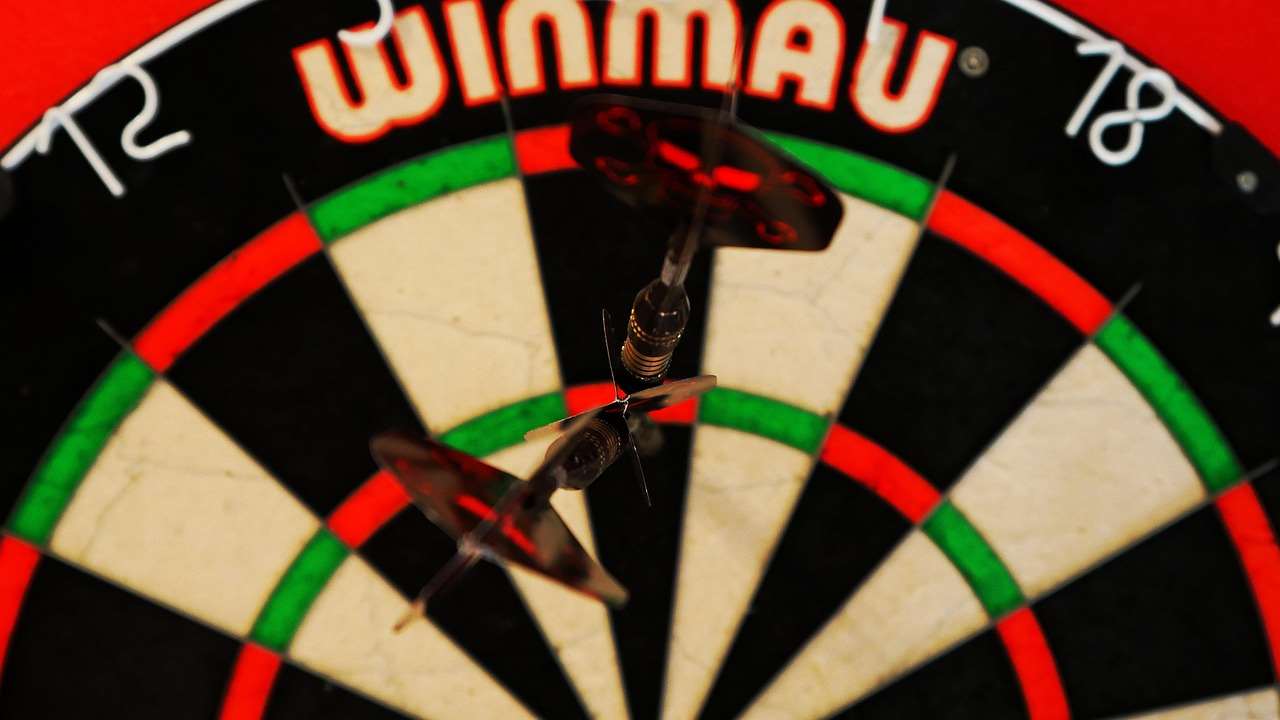Practicing sportsmanship in darts: essential etiquette tips is key to enjoying the game and fostering a positive atmosphere. This article outlines crucial darts etiquette, covering everything from pre-game conduct to post-match behavior, ensuring fair play and respect for all participants. You’ll discover tips to enhance your game while upholding the spirit of darts.
⚠️ Still Using Pen & Paper (or a Chalkboard)?! ⚠️
Step into the future! The Dart Counter App handles all the scoring, suggests checkouts, and tracks your stats automatically. It's easier than you think!
Try the Smart Dart Counter App FREE!Ready for an upgrade? Click above!
The Foundation of Sportsmanship in Darts: Essential Etiquette Tips
Sportsmanship in darts goes beyond simply following the rules; it’s about respecting your opponent, the game itself, and the overall spirit of competition. It creates a more enjoyable and positive environment for everyone involved, whether you’re playing in a casual setting or a competitive tournament. Understanding and practicing good darts etiquette is paramount to being a respectful and admired player.
What Does Good Sportsmanship Look Like in Darts?
Good sportsmanship in darts manifests in several ways:
- Showing respect for your opponent, regardless of their skill level.
- Accepting both wins and losses gracefully.
- Adhering to the rules of the game.
- Avoiding distractions or disruptive behavior.
- Acknowledging good shots from your opponent.
- Maintaining a positive attitude throughout the game.
By embodying these characteristics, you contribute to a more positive and enjoyable experience for yourself and others. It also enhances your reputation as a player and demonstrates a commitment to the integrity of the sport. Remember that fair play is the cornerstone of any sporting event.

Pre-Game Etiquette: Setting the Stage for Fair Play
The foundation of good sportsmanship is laid even before the first dart is thrown. Pre-game etiquette sets the tone for the match and ensures that everyone is on the same page regarding rules and expectations. Here are some important aspects of pre-game etiquette:
Introductions and Greetings
A simple introduction and a handshake are customary before the game begins. This gesture shows respect for your opponent and establishes a friendly atmosphere. A sincere “good luck” wish is also appropriate.
Confirming the Rules
Before starting, ensure both players are clear on the darts rules being used, especially in casual settings where variations might exist. Agreeing on the format (e.g., 501, 301, cricket) and any specific house rules prevents misunderstandings and disputes later on. You might want to check out Simplified 501 game rules for novice players for more information.
Checking the Dartboard and Oche
Before the game, both players should inspect the dartboard to ensure it is in good condition and properly mounted. The height and distance of the oche (throwing line) should also be verified to comply with official regulations. Addressing any issues beforehand avoids potential complaints during the match.
Agreeing on Scoring Procedures
Clarify how scores will be recorded and announced. Will a chalkboard or electronic scoreboard be used? Who will be responsible for calling the scores? Establishing these procedures prevents confusion and ensures accurate record-keeping.
During the Game: Upholding Respect and Fair Play
Maintaining good sportsmanship during the game is crucial for fostering a positive and competitive environment. Here are some key aspects to consider:
Respecting Your Opponent’s Throw
This is perhaps the most fundamental aspect of darts etiquette. When your opponent is at the oche, avoid any actions that could distract or disrupt their concentration. This includes:
- Making unnecessary noise.
- Moving around excessively.
- Standing directly in their line of sight.
- Talking while they are throwing.
Even seemingly innocuous actions can be distracting, so err on the side of caution and remain still and silent while your opponent is throwing. Showing respect also extends to the way you react to their throws. Avoid negative comments or gestures, even if they miss the target. Remember that everyone has off days, and constructive encouragement is always more appreciated.
Calling Your Scores Clearly
Announce your scores clearly and accurately after each turn. This ensures that both players are aware of the current state of the game. If there is any doubt or disagreement about the score, calmly and respectfully discuss it until a resolution is reached. If necessary, consult a neutral third party to help resolve the issue. Always double-check your scores to ensure accuracy.
Avoiding Gamesmanship
Gamesmanship refers to actions that are technically within the rules but are designed to unfairly gain an advantage over your opponent. Examples of gamesmanship in darts include:
- Deliberately slow play to disrupt your opponent’s rhythm.
- Making misleading statements about your score.
- Attempting to intimidate your opponent with aggressive behavior.
While a bit of psychological gamesmanship is part and parcel of competitive sports, it’s important to toe the line and be careful not to let things devolve into unsportsmanlike behavior.
Handling Close Calls and Disagreements
Disagreements about scores or dart placement can arise, especially in casual games without official referees. In such cases, it’s crucial to remain calm and respectful. Discuss the issue rationally, and if possible, try to find a mutually agreeable solution. A replay of the throw might be necessary if the dart’s position is unclear. Remember that the goal is to resolve the issue fairly and maintain the integrity of the game. You may even be able to adapt rules from Adapting darts rules for beginners.

Post-Game Conduct: Ending on a High Note
The way you behave after the game is just as important as your conduct during the match. It’s an opportunity to demonstrate sportsmanship and leave a positive impression, regardless of the outcome. Here are some essential tips for post-game etiquette:
Offering a Handshake and Congratulations
Whether you win or lose, always offer your opponent a handshake and a sincere “good game” or “congratulations.” This simple gesture shows respect and acknowledges their effort. Avoid making excuses or downplaying their victory. If you lost, accept it gracefully and offer genuine praise for their performance.
Acknowledging Good Shots and Performances
Take a moment to acknowledge any particularly impressive shots or moments during the game. This shows that you were paying attention and appreciate their skill. A simple “nice shot” or “well played” can go a long way in fostering goodwill.
Avoiding Gloating or Sore Losing
Gloating after a win is considered extremely bad form. Avoid boasting about your victory or making disparaging remarks about your opponent’s performance. Similarly, sore losing is equally unacceptable. Don’t make excuses, blame your equipment, or question the fairness of the game. Accept the loss with dignity and focus on what you can learn from the experience.
Leaving the Playing Area Tidy
As a courtesy, ensure that the playing area is left clean and tidy after the game. Pick up any stray darts, remove any personal belongings, and dispose of any trash. This shows respect for the venue and the next players who will be using the space.

Dealing with Unsportsmanlike Conduct
Unfortunately, not everyone adheres to the principles of sportsmanship. You may encounter opponents who engage in unsportsmanlike behavior, such as trash-talking, cheating, or disruptive actions. Here’s how to handle such situations:
Staying Calm and Composed
The most important thing is to remain calm and avoid reacting emotionally. Don’t let your opponent’s behavior provoke you into responding in kind. Retaliating with unsportsmanlike actions will only escalate the situation and damage your own reputation.
Addressing the Issue Directly (But Respectfully)
If the behavior is minor, you can politely address the issue directly with your opponent. For example, if they are making excessive noise while you are throwing, you can calmly ask them to be more considerate. Use a respectful tone and avoid making accusations or insults.
Involving a Third Party (If Necessary)
If the behavior is more serious or persists despite your attempts to address it, involve a neutral third party, such as a tournament official or a league representative. They can mediate the situation and take appropriate action to address the unsportsmanlike conduct. Remember, creating How to make darts fairer with handicap rules can often address skill mismatches that lead to frustration.
Focusing on Your Own Game
Ultimately, the best way to deal with unsportsmanlike conduct is to focus on your own game and not let your opponent’s behavior distract you. Maintain your composure, stick to your strategy, and let your performance speak for itself. Remember, sportsmanship in darts is essential and can be taught to even young beginners if you’re Adapting dart game rules for children.
Sportsmanship Beyond the Oche: Representing the Game
Your commitment to sportsmanship extends beyond the confines of the game itself. How you represent the sport in general reflects on both you and the darts community. This includes:
Promoting Positive Interactions
Encourage good darts etiquette among your peers. Gently correct any unsportsmanlike behavior you witness and promote a culture of respect and fair play within your local darts scene. This creates a more welcoming and enjoyable environment for everyone.
Mentoring New Players
If you are an experienced player, consider mentoring new players and teaching them the principles of sportsmanship. Share your knowledge of the game and emphasize the importance of respecting opponents, following the rules, and maintaining a positive attitude. Doing so guarantees that the game stays healthy for years to come.
Respecting the Venues
Treat the venues where you play with respect. Clean up after yourself, avoid damaging the equipment, and be mindful of other patrons. This demonstrates that you value the venues and helps ensure that they remain welcoming places for dart players.

The Long-Term Benefits of Sportsmanship
Practicing good sportsmanship in darts offers numerous long-term benefits:
- Improved Reputation: You will be respected and admired by your peers as a fair and gracious player.
- Enhanced Enjoyment: The game will be more enjoyable when played in a positive and respectful environment.
- Stronger Relationships: You will build stronger relationships with other players based on mutual respect and camaraderie.
- Personal Growth: You will develop valuable qualities such as humility, empathy, and self-control.
- Positive Impact on the Sport: You will contribute to a culture of sportsmanship that benefits the entire darts community.

Conclusion: Elevating the Game Through Sportsmanship
In conclusion, sportsmanship in darts: essential etiquette tips, goes far beyond simply following rules; it’s about cultivating respect, fairness, and a positive attitude. By adhering to pre-game, in-game, and post-game etiquette, you not only elevate your own playing experience but also contribute to a more enjoyable and respectful environment for everyone involved. Embrace these principles, and you’ll find your love for the game, and the respect you receive from other players, will grow exponentially. Now, put these darts etiquette tips into practice and share them with your fellow dart enthusiasts to foster a culture of sportsmanship in your local darts community! Remember to always respect your opponent and play fair to uphold the integrity of the game.
Hi, I’m Dieter, and I created Dartcounter (Dartcounterapp.com). My motivation wasn’t being a darts expert – quite the opposite! When I first started playing, I loved the game but found keeping accurate scores and tracking stats difficult and distracting.
I figured I couldn’t be the only one struggling with this. So, I decided to build a solution: an easy-to-use application that everyone, no matter their experience level, could use to manage scoring effortlessly.
My goal for Dartcounter was simple: let the app handle the numbers – the scoring, the averages, the stats, even checkout suggestions – so players could focus purely on their throw and enjoying the game. It began as a way to solve my own beginner’s problem, and I’m thrilled it has grown into a helpful tool for the wider darts community.